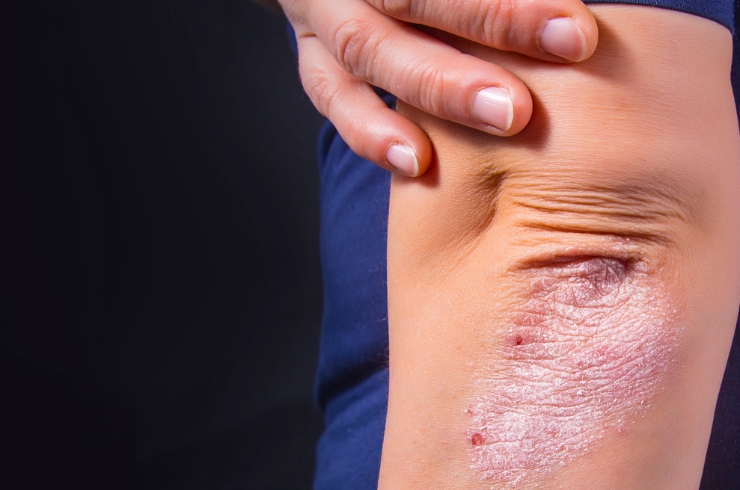Chronic autoimmune skin disease causing red, scaly patches; often triggered by stress, infections, or environmental factors.

Psoriasis is a chronic autoimmune skin condition that causes the rapid buildup of skin cells, resulting in thick, inflamed, and scaly patches. This condition affects individuals of all ages and is influenced by a combination of genetic, immune, and environmental factors. Although not contagious, psoriasis can have a profound impact on both physical appearance and emotional well-being.
Symptoms may appear suddenly or develop gradually, often fluctuating in intensity over time. Triggers like stress, poor diet, infections, and environmental irritants can lead to flare-ups. Early identification and holistic care are essential to manage symptoms, prevent complications, and promote long-term remission. People with psoriasis commonly experience the following symptoms:
Raised, red patches of skin covered with silvery-white scales (plaques)
Itching, burning, or soreness in affected areas
Dry, cracked skin that may bleed or become painful
Small, dot-like lesions (more common in children, as seen in guttate psoriasis)
Thickened, pitted, or discolored nails in cases of nail psoriasis
Stiff or swollen joints, particularly in those with psoriatic arthritis
Rashes that worsen in skin folds (inverse psoriasis), such as underarms or groin
Pus-filled bumps on red skin in pustular psoriasis (a more severe type)
Generalized redness and peeling over large areas in erythrodermic psoriasis
Sensitivity or flare-ups triggered by stress, infections, weather changes, or certain foods
At Dr. Bharti’s Holistic Wellness, our Holistic Corrective Program (HCP) addresses these symptoms at their root—focusing on detoxification, immune regulation, nutritional therapy, and natural healing techniques for sustainable skin and systemic wellness. By correcting internal imbalances and optimizing lifestyle factors, we help individuals achieve clear skin and improved overall health—naturally and effectively.

Psoriasis is a chronic autoimmune skin disorder characterized by the accelerated production of skin cells, leading to the formation of thick, scaly, and inflamed patches. This persistent condition disrupts the life cycle of skin cells, causing them to accumulate rapidly on the skin’s surface, manifesting as silvery-white scales and red, itchy lesions. The severity of psoriasis varies among individuals, ranging from mild nuisance-level patches to severe, debilitating outbreaks that can significantly affect quality of life. While the exact cause of psoriasis remains elusive, it is widely believed to result from a complex interplay of genetic predisposition, immune system dysfunction, and environmental triggers. Factors such as stress, poor diet, lack of physical activity, hormonal imbalances, and exposure to pollutants contribute to the exacerbation of symptoms. Although psoriasis is not contagious, its visible manifestations can lead to social stigma, emotional distress, and even depression, making holistic management essential. While there is no absolute cure, lifestyle modifications, dietary interventions, and natural treatment protocols can help in alleviating symptoms and achieving prolonged remission.
Psoriasis manifests in several distinct forms, each exhibiting unique characteristics and varying degrees of severity. Plaque Psoriasis, the most common type, appears as raised, inflamed patches covered with silvery scales, commonly found on the knees, elbows, and scalp. Guttate Psoriasis presents as small, drop-like pink lesions, typically triggered by bacterial infections and often affecting children and young adults. Inverse Psoriasis, characterized by smooth, red, and inflamed lesions, commonly develops in skin folds such as under the breasts, around the genitals, and in the armpits. Pustular Psoriasis, a more severe form, results in white pustules filled with pus, accompanied by widespread redness and scaling. Erythrodermic Psoriasis, the rarest and most aggressive variant, causes intense redness, inflammation, and peeling over large areas of the body, often accompanied by fever and severe discomfort. Nail Psoriasis affects the fingernails and toenails, leading to pitting, discoloration, and structural deformities, while Psoriatic Arthritis causes joint inflammation and deformities, significantly impacting mobility. Each type of psoriasis demands a tailored approach to treatment, incorporating dietary corrections, stress management, immune modulation, and detoxification to mitigate symptoms and prevent flare-ups.
A comprehensive, holistic approach to psoriasis focuses on detoxification, immune regulation, and lifestyle adjustments to restore internal balance. Avoiding allergenic and inflammatory foods, such as processed sugars, dairy, and gluten, is crucial in reducing immune system overactivity. Optimizing digestive health through the regulation of the biological clock, consuming gut-friendly foods, and ensuring proper nutrient absorption plays a pivotal role in alleviating symptoms. Detoxifying vital organs like the liver, kidneys, and colon through natural chelation methods enhances the body’s ability to eliminate toxins and maintain a healthy acid-alkali balance. Supplementing with phytonutrients, antioxidants, and essential vitamins ensures cellular nourishment and strengthens immune resilience. Physical exercise, yoga, and mindfulness practices further accelerate the healing process by reducing stress levels and enhancing blood circulation. Patients often experience visible improvements within weeks, with optimal recovery occurring over four to six months. The holistic approach not only addresses psoriasis but also rejuvenates overall well-being, leading to enhanced energy levels, improved digestion, better skin health, and long-term disease management. With a dedicated commitment to natural healing, individuals can regain control over their condition and enjoy a healthier, more fulfilling life free from the burden of psoriasis.